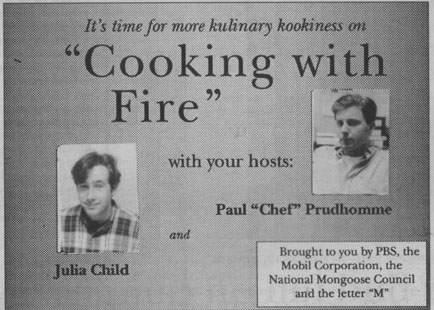By Jeffrey Carl and Paul Caputo

Paul Caputo and I began writing humor columns together for the University of Richmond Collegian at the beginning of my Junior year. Paul had started his term as The Collegian’s opinion section editor that year, or maybe he hadn’t. I don’t really remember. Maybe it was me, or possibly Scott Shepard. I know it happened sometime during college. At any rate, Paul and I started writing together and later with Shepard as well. It was the start of a writing partnership that would last years and ultimately result in no tangible lasting value except for some free baseball tickets. I originally had something much more positive in mind when I started writing this introduction.
by Joseph Campbell and Bill Moyers
Moyers: Why do we need Good? So that we can have Evil? In every culture, religion and the myths it creates serve to control society and, ultimately, culture. The myth of the mysterious character of The Ticket Lady is a legend that occurs in nearly every culture ever studied. Is this an inherent need every society possesses for a black sheep, or is she just a weasel?
Campbell: No. Actually, every society has a need for collecting obscene amounts of money for miniscule traffic violations. The Babylonians, who, though they did not possess automobiles, foresaw the need for extra parking spaces, called this figure “Gilgamesh.”
Moyers: Really?
Campbell: No. That was just a myth created because the far-sighted Babylonians saw the need for Core Courses one day and became determined to develop the most boring myth possible. Actually, they called this figure “Ur-Golgothis.”
Moyers: The Core Course. Now, I remember taking that course. I recall thinking, “This is interesting, but shouldn’t we be learning something more Western?” I feared the PC police were taking over my college curriculum. I suspected that this had something to do with the imposing figure of the Ticket Lady, or possibly Scott Shepard. Was there a connection?
Campbell: No. The “Shepard Figure” of most early cultures reflected their primal need to have weird Southern accents and be crypto-fascists. The Ticket Lady myth goes deeper.
Moyers: Like the myth of the Light-Bringer of the Aztecs?
Campbell: No. You are on crack. What I was talking about was the primal need for a figure of supreme evil, which would ride around in a little electric cart.
Moyers: One time this enormous football player with a band-aid on his forehead driving a little electric cart crashed into me while I was walking to class. I stayed crumpled in a heap near the Gottwald Taco Bell, whilst stupid people on mountain bikes and skateboards ran over me. It wasn’t until three days later that the Ticket Lady rescued me on her cart. I remember being in awe of her prowess as she pressed those little buttons on that little deally thingy she has. Is it possible that the Ticket Lady could also serve as a force of compassion and love, and not just spite and cold-heartedness?
Campbell: Yes.
Moyers: Really?
Campbell: No. But there are two faces to the myth. Animus and anima. Venus and Cupid. Ticket Lady and Ticket Boy.
Moyers: Does that have anything to do with Flagboy? Is there a Flaggirl?
Campbell: No. The Flagboy myth is a separate myth which deals with each society’s need for seriously annoying people. The Mesopotamians called this “Kwisatz-Haderach.” The early Sumerians called this “Irritating Boy.” But the separate entities of Ticket Lady and Ticket Boy go back to something deeper. The two faces of the Ticket Lady reflect the thousand faces of the Home Shopping Network. It also reflects every culture’s need for being drunk and going to Getty Mart. The Chinook Indians called this “Getty-Mart.”
Moyers: Flagboy was pretty cool. I don’t know that I have ever actually been drunk, but one time I drank 13 32-ounce Mountain Dews at the Getty Mart free refill soda fountain. I went to a fraternity party and they wouldn’t let me in, so I just ran straight through the wall. I was pretty hopped up. Is there a connection?
Campbell: No. By the way, nobody likes you. The myth of the Mountain Dew-buzz, which the ancient Gauls called “WHOOOOOOOOOO-DOGGGEEEEEEEEZ!” is part of the subconscious need for drugs when you don’t have anything else, like free Ny-Quil from the Student Health Center.
Moyers: I went to the Student Health Center once. I thought I had a headache. Turns out I was just pregnant. Cool, huh?
Campbell: No. But as I was saying, the Running-Through-Walls myth relates back to each society’s primal need to be stupid. And yet the Ticket Lady shows us how the power of mythology can recreate us, can redefine our relationship to the world, and can give us tickets.
Moyers: Ah. So the Ticket Lady serves a useful function?
Campbell: No. But the myth remains. There is what is known, there is what is unknown, and in between is the Ticket Lady. Mythology remains a powerful force for enforcing the aforementioned minor traffic violations. The ancient Hebrews called this “Yahweh.” The ancient Phoenicians called this “Not Graduating Until You Pay Your Ticket Fines.” I call it “Herbert.” But the power of the myth remains the same. The myth of pointless tickets remains powerful, intriguing and irritating.
Moyers: I ate too many Buffalo wings at Friday’s a couple days ago and I booted all over the parking lot. At any rate, I had really vivid dreams that night, and I remember that in one of them, I was walking alone through the puddles outside the Commons and the Ticket Lady came to me. She drove up to me and her little mobile deally looked as if it was floating, and she said, in a really deep voice, “Richmond is #1 because Wake Forest got moved up to the ‘Real College’ category.” I was so happy, yet at the same time so empty. Does this relate to the eternal myth?
Campbell: No. But the significance of the dream remains unchanged, in that it is pointless, like…
Moyers: A degree in Leadership? The coordinate system? The Greek system?
Campbell: No. Bite me. And, as aforementioned, everybody hates you. As I was saying, the dream is lame, like Pauly Shore movies or small dogs attempting to eat you. Incidentally, the myth of the Scary Old Guy Walking Around The Lake With The Irritating Little Dog is shared in many cultures.
Moyers: Really?
Campbell: Yes.
Moyers: You’re serious?
Campbell: No. The mythological significance of the Ticket-Boy-as-Tragic-Hero is deeper than the myth of the Chicken-Sandwich-and-Bacon-as-Separate-Entrées. There is a feeling of loneliness in each culture that needs an expression — a feeling of despair, a feeling of nausea, a feeling up of the girl sitting next to you at a party when everybody’s drunk anyway. The myth also expresses a culture’s search for a figure who is kind of minty-flavored and improves gas mileage.
Moyers: Like Fla-Vor Ices, or the show “Newhart.” I know what you mean. But what about her role as arbiter of divine intervention? Can we draw a parallel to the myth of Pebbles From the D-Hall, Bringer of Divine Guidance and Fried Or Baked Chicken?
Campbell: No. Bite me.
Moyers: I see. How does that relate to you kissing my — as the ancient Incas called it — big white ass, you queer-as-a-three-legged-picnic-basket, dumb-as-a-small-dog-sniffing-glue, ornery-as-a-snake-with-hemorrhoids, more-evil-than-Megatron-leader-of-the-Decepticons-from-Transformers son-of-a-six-legged-Nazi-motorcycle-gang?
Campbell: No. Bite me.
Moyers: That concludes our interview. Good night and God bless. By the way, I am an atheist. So leave me the Hell alone.
Campbell: And bite me.


